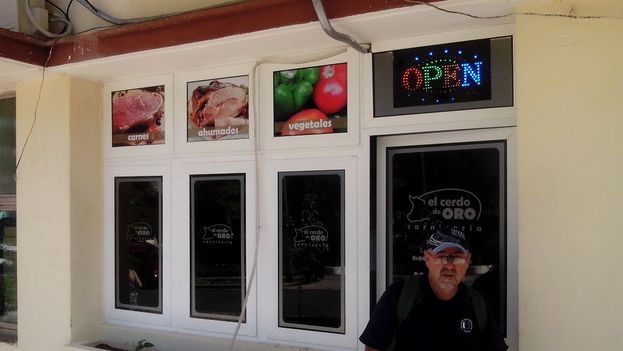
14ymedio, Victor Ariel Gonzalez, Havana / 6 November 2014 — It’s ten in the morning, and the Golden Pig is packed with customers. On entering, one detects the intense odor of smoked meat mixed with the aroma of ripe guavas. Two salesmen work behind the counter, and a third places fruits in their boxes.
They almost have no time to assist the journalist who is interested in knowing how they have managed to start this business. This is not just any market; there are electronic scales, vertical refrigerators, air conditioning and — most surprising – the cleanliness and organization are infinitely superior to those of the typical farmers’ markets of Havana, those built hurriedly under zinc plates where flies swarm and mud has stained everything.
Here it is different. This is a small shop inside a building at the corner of Linea and 10 in Vedado. They threw cement on the floor and oiled it, installed dark windows and put an attractive label over the glass. “We took two months to prepare this,” says one of the workers when he can finally answer some questions. “You already saw that it is full,” the man continues. “In December I imagine that we are going to even need a doorman!” Success has come to them quickly since they have only been open a few weeks.
The Golden Pig functions as a cooperative. On one of the walls, over the counter, hangs the license that the State grants for this form of private activity that is gaining momentum and opening new businesses at several locations in the city.
So, for example, there is also El Barrio market, close to the embassy of the Czech Republic. It is easy to pass by if you are not familiar with it because, seen from outside, the closed garage does not have much paint for being a business. Inside, the presentation of products is even more attractive than the previous place. They possess a big refrigerated counter with all the offers in view, already packaged and with labels printed in Cuban pesos. They have a shiny machine for making slices at the customer’s request and an area in back where they prepare the packages. There are not those so disagreeable odors that one usually smells in the state butcher shops that sell in CUC (hard currency).
There are not those so disagreeable odors that one usually smells in the state butcher shops that sell in CUC
In El Barrio a saleslady explains how a business of this type can be pulled off. The required license is “retail seller of agricultural products” and is sought in the municipal offices of the Ministry of Work and Social Security. “It took us five months to take the necessary steps for the permit, but the advantage of this activity is that we do not need a health certificate like our suppliers,” she says before assisting another recently-arrived customer.
“Although we have to pay a lot in taxes, we manage to profit,” says a staff member at the Golden Pig. The prices on the boards are well above what the pocketbook of the common man can pay, although similar to those found elsewhere. “Our advantage is that we have made a different presentation, and people like that,” say the workers of the other store.
Mind you, it will never be possible to find beef in any of these businesses. Not even cow’s milk or its derivatives. The yogurt they offer in one of these butcher shops, where they sell several types of foods, is made with goat’s milk. Neither are they permitted to trade in imported products.
In spite of the administrative tethers and the enormous limitations that the government places on the offer of products, private initiative little by little paves the way in this economy that insists on calling itself “socialist” and “planned.” Nevertheless, the paltry purchasing power of the population means few Cubans can give themselves the luxury of entertaining their families with a pork leg – a month’s average salary – and some mouthwatering fresh lettuce leaves wrapped in clear plastic.
Translated by MLK
